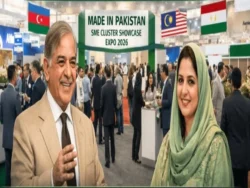Pakistan’s textile industry embraces ESG practices: Sustainability that lasts

26 February 2024
Published in: Business Recorder
Introduction
In a transformative shift, Pakistan’s textile industry is setting new standards for sustainability as global markets, particularly Europe and the US, intensify their scrutiny of imports. Environmental, Social, and Governance (ESG) factors have become paramount, with consumers and regulators demanding adherence to higher standards across the entire value chain.
Sustainable strategies across the value chain
Pakistan’s textile exports to Europe and the US have surged, driven by a newfound commitment to ESG practices. These markets now prioritize sustainability, and failure to meet their stringent criteria could jeopardize Pakistan’s exports. To safeguard its position, Pakistan has proactively embraced global standards, positioning itself favorably for continued export growth, including the preservation of its Generalized System of Preferences (GSP) Plus status.
Europe has led the charge in adopting ESG regulations, mandating compliance. Businesses failing to adhere face substantial penalties, emphasizing the seriousness of ESG guidelines. Pakistan, however, has risen to the challenge, with companies swiftly aligning with regulations to ensure uninterrupted access to key markets.
Pakistan’s textile industry, a cornerstone of the economy, is undergoing a profound transformation in response to ESG demands. While challenges persist, such as the perceived cost of sustainability initiatives, industry leaders debunk such notions. Drawing inspiration from success stories like Bangladesh, Pakistan’s companies are proving that ESG compliance can enhance competitiveness rather than impede it.
Driving forces of sustainability
The Ministry of Commerce in Pakistan, in collaboration with international partners, spearheads initiatives to enhance sustainability in the textile industry. By focusing on labor rights, social standards, and environmental practices, these efforts aim to bolster economic resilience and competitiveness while addressing critical challenges in the sector.
On the other hand, initiatives led by industry pioneers like MG Apparel and other prominent textile companies such as Sarena Textiles, Crescent Bahümán Textiles, Crestex, Interloop, US Apparel and Textiles, Yunus Textile Mills and many others exemplify Pakistan’s steadfast commitment to sustainability.
While major textile companies are driving these sustainability initiatives forward, Micro, Small, and Medium Scale Enterprises (MSMEs) in the textile sector are also recognizing the urgent need to improve working conditions and enhance competitive potential. With increasing demand from international buyers for sustainably produced textiles, Pakistan’s textile industry is undergoing a significant modernization process where sustainable production is a key success factor. As Pakistan’s Textile Value Chain (TVC) is disaggregated and strict compliance applies to the entire textile value chain, MSMEs are stepping up their sustainability goals and adapting Environmental, Social, and Governance (ESG) practices to remain competitive and align with international standards.
External allies in the journey
External organizations, including WWF-Pakistan and TÜV Rheinland, have been instrumental in supporting Pakistan’s textile industry on its sustainability journey. Programmes like GIZ’s TextILES provide invaluable guidance on initiatives such as the EU Green Deal, aligning Pakistani businesses with international standards on chemicals management such as Zero Discharge of Hazardous Chemicals (ZDHC), and health and safety.
Environmental and social/ethical commitments
Industry’s dedication to international conventions is seen in its integrated approach of aligning development activities with Vision 2050. Companies demonstrate their long-term commitment to environmental sustainability and women’s empowerment by encompassing responsible sourcing, adopting renewable energy sources, water stewardship, energy conservation, enhancing carbon sinks and employee welfare. Companies have acquired crucial certifications, demonstrating unwavering commitment to environmental and social responsibility. Notable achievements include significant reductions in water consumption, energy savings, and emissions elimination, thus embracing green revolution in the supply chain.
Companies’ impactful community programmes as part of effective CSR policies have provided employment opportunities and access to education and healthcare. Steadfast investment in community engagement projects indicates the fact that social compliances are embraced effectively.
Transparency and governance measures
Supply chain visibility is crucial for ensuring transparency throughout the textile industry. This involves tracing the origin of raw materials, monitoring production processes, and tracking the distribution of finished products.
Pakistan’s textile industry has recognized supply chain traceability as a significant aspect of ensuring transparency and accountability throughout the supply chain. For the first time in Pakistan’s history, industry associations, government, individual firms, and international organizations are collaborating to unanimously develop national standards on supply chain traceability. These standards, under a legal regulatory framework, will be enforced through the National Compliance Centre (NCC). NCC will act as the lead agency designing, regulating, and implementing comprehensive supply chain traceability requirements for export-oriented firms.
Individual companies have made strides towards enhancing firm-level supply chain transparency in alignment with the global requirements. Prominent companies have adopted the most advanced traceability technologies such as LoopTrace and FibreTrace to consciously champion supply chain transparency in the global market. Companies’ ongoing investment in sustainable, clean and transparent supply chain validates their firm commitment to comply with the prerequisite to sustainability in the supply chain that is traceability.
Integrity, responsibility, and transparency are the major components of corporate governance. To ensure the incorporation of these components in all operations, textile firms in Pakistan are encouraging women’s participation in decision-making (top leadership). Regular record-keeping and audits are mandatory to avoid corruption, and performance indicators (KPIs) are devised to ensure ethical compliances and stakeholder-centric approaches.
Government-led initiatives and policies
The Government of Pakistan has implemented several initiatives to support the textile industry flourish sustainably through best ESG practices.
The Textile and Apparel Policy 2020-2025 is one notable step that aims to boost textile exports, enhance industry’s compliance to the global ethical and environmental requirements and promote nation-wide skill development and employment. The policy is committed to making Pakistan a global sustainable sourcing hub, as it encourages the transition to energy efficiency, circular economy and investment in sustainable technologies.
Ministry of Commerce, in thorough consultation with the industry stakeholders, has established the first-ever National Compliance Centre (NCC) that aims to enhance transparency and accountability by monitoring and enforcing compliance with relevant regulations, particularly concerning worker rights, safety, and environmental sustainability.
These along with other significant initiatives on skill development and TVET (Technical and Vocational Education and Training) programmes indicate government’s robust commitment to promoting social sustainability, environmental stewardship, circularity and good governance in Pakistan’s textile industry.
Addressing challenges and seizing opportunities
Despite several exceptional initiatives, challenges persist in the textile industry. Supply chains need to be more transparent regards to regular data disclosures on labor practices, environmental impact and working conditions. Transparency efforts in this area must include the implementation of codes of conduct, factory inspections, and worker empowerment programs.
More efforts are required to comply with environmental protocols concerning water conservation, greenhouse gas emissions, and chemical pollution. Transparency initiatives such as the use of eco-friendly materials, energy-efficient practices, and environmental reporting must be included in this area.
By embracing sustainability, Pakistan’s textile industry can not only address environmental and social challenges but also unlock new opportunities for growth, innovation, and competitiveness in the global market. These opportunities include access to new markets by meeting consumer requirements, increased profitability by manufacturing sustainable high value-added products, cost savings by improving resource (water and energy) efficiency, less risk of non-compliance penalties and reputational damage, enhanced competitiveness by producing innovative products, improved reputation and supply chain resilience.
Consumer trends and market dynamics
Pakistan’s textile industry is witnessing a resurgence fueled by reforms, attracting attention as a cost-effective labour source amidst shifting global dynamics. As consumer trends favour smaller order volumes, Pakistan’s advantage in fulfilling such orders efficiently has become evident, while sustainability imperatives and ESG compliance underscore the need for industry players to adapt. Initiatives promoting gender inclusion and labor wellbeing further enhance the industry’s appeal, positioning it for sustainable growth and competitiveness in international markets.
Industry collaboration
Pakistan’s textile industry continues to forge ahead on its ESG journey through active participation in international trade and textile events/exhibitions such as Heimtextil 2024. Spearheaded by the Trade Development Authority of Pakistan (TDAP), the industry emphasizes sustainable production and innovation, as showcased by esteemed entities like Sadaqat Limited and Lucky Textile Mills.
The introduction of ‘Econogy’ underscores the industry’s focus on integrating economy and ecology for long-term success. Similarly, Pakistan’s participation in the 31st Dakar International Trade Fair 2023, supported by the Pakistan Embassy in Senegal and TDAP (trade development authority of Pakistan), showcases a diverse range of products while fostering business connections and promoting Pakistani goods.
This collective effort reflects Pakistan’s manufacturing prowess and export potential in the global market, reinforcing its position as a key player in the textile industry.
Conclusion
As global markets increasingly prioritize sustainability, Pakistan’s textile industry is adapting to remain competitive. Initiatives aimed at improving ESG compliance, along with support from governmental and non-governmental organizations, are essential for driving sustainable practices across the value chain.
By embracing sustainability as a strategic imperative, Pakistan’s textile industry is securing its position in international markets but also contributing to long-term environmental and social welfare.





